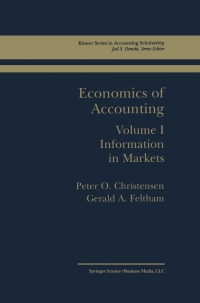Question
Professor John Morton has just been appointed chairperson of the Finance Department at Westland University. In reviewing the departments cost records, Professor Morton has found
Professor John Morton has just been appointed chairperson of the Finance Department at Westland University. In reviewing the departments cost records, Professor Morton has found the following total cost associated with Finance 101 over the last five terms:
| Term | Number of Sections Offered | Total Cost | |||
| Fall, last year | 4 | $ | 13,000 | ||
| Winter, last year | 3 | $ | 7,500 | ||
| Summer, last year | 7 | $ | 13,500 | ||
| Fall, this year | 5 | $ | 10,000 | ||
| Winter, this year | 2 | $ | 6,500 | ||
Professor Morton knows that there are some variable costs, such as amounts paid to graduate assistants, associated with the course. He would like to have the variable and fixed costs separated for planning purposes.
1. Prepare a scattergraph plot. (Plot total cost on the vertical axis and number of sections offered on the horizontal axis.)
2-a. Using the least-squares regression method, estimate the variable cost per section and the total fixed cost per term for Finance 101.
2-b. Express these estimates in the form Y = a + bX.
3-a. Assume that because of the small number of sections offered during the Winter Term this year, Professor Morton will have to offer nine sections of Finance 101 during the Fall Term. Compute the expected total cost for Finance 101.
3-b. Can you see any problem with using the cost formula from (2) above to derive this total cost figure?
Step by Step Solution
There are 3 Steps involved in it
Step: 1

Get Instant Access to Expert-Tailored Solutions
See step-by-step solutions with expert insights and AI powered tools for academic success
Step: 2

Step: 3

Ace Your Homework with AI
Get the answers you need in no time with our AI-driven, step-by-step assistance
Get Started


